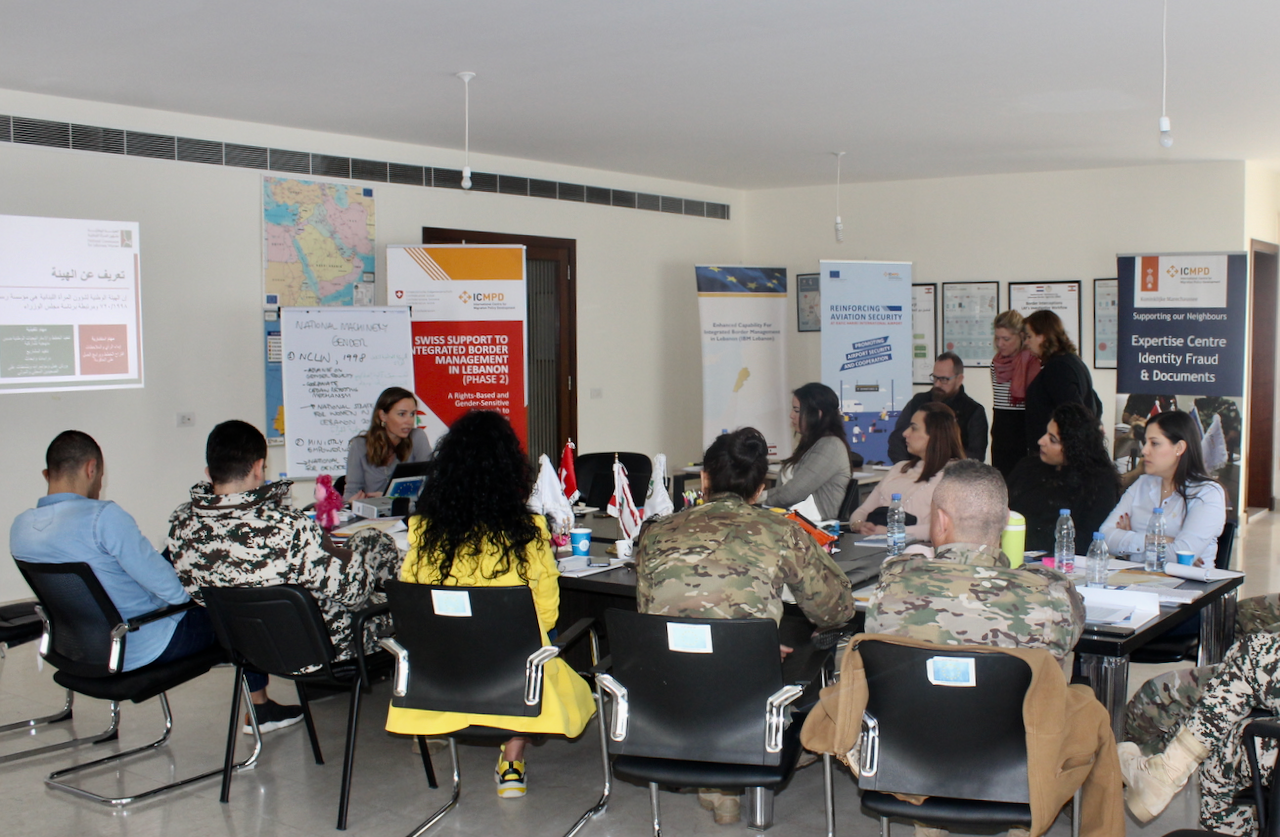Members of Lebanon’s Security Apparatus participate in awareness-raising sessions on gender-specific issues for more effective operations
Date:

“It is not normal for a man to stay at home,” said one man following the screening of UN Women’s video “Understanding Masculinities in Lebanon: Adnan’s Story” in which Adnan speaks about how he helps around the house and with the children while his wife travels for work.” The video shows the evolution of Lebanese society”, said a woman, of the short clip created under UN Women’s regional programme Men and Women for Gender Equality. Both of them are members of the Lebanese security forces. Along with 251 other male and female members, they have been enrolled in trainings on gender equality and stereotypes in Lebanon, as part of the Government of Switzerland’s support to Integrated Border Management.
Within the project Swiss Support to Integrated Border management (IBM) in Lebanon (Phase 2) implemented by the International Center for Migration Policy development (ICMPD), the Lebanese security apparatus, including the General Security (GS), the Internal Security Forces (ISF) and the Lebanese Armed Forces (LAF) took the decision to undertake gender awareness activities by participating to this project, where brainstorming and open discussions aimed at making the work and operations of these agencies more effective.
By generating discussions around issues of gender and women’s rights among agencies and authorities responsible for the management of displaced and refugee populations, the project aims at fostering a rights-based and gender-responsive approach to border and migration management. Lavinia Lys Brera, Project Manager with ICMPD said “gender has progressively become one of the key areas of our work”.
Stefan Röthlisberger, First Secretary at the Embassy of Switzerland to Lebanon, noted that Switzerland’s decision to engage in the Integrated Border Management in Lebanon “was taken against the background of an expanded Swiss engagement in the region in general, and in Lebanon, in particular.” He added that “gender is a top priority for Switzerland, because as our own experience – as well as all the scientific study on the topic – shows, it is key to providing equal opportunities and reaping a society’s full potential. This, in the long term, is the basis for social peace and thus important to any society”.
Michael Bisi, an expert trainer with ICMPD, works to facilitate conversation around the roles of men and women in society, particularly with regards to work, gender stereotypes, child-care and housework. Bisi recalled that during the initial brainstorming, covering topics such as gender and sex, gender roles, gender-based violence, harassment, gender equality, non-discrimination, many participants confused the concept of ‘gender’ with race, religion or nationality. Bisi noted that “new generations were more open to the concept of gender”. Colonel Ziad Kaed Bey, Head of the Training Department at ISF, said that the agency regularly undertakes training sessions on gender, women’s rights and domestic violence and collaborates with relevant international organizations, the United Nations agencies and NGOs, in this regard.
Vanessa Wehbe, Sergeant in chief at the Research and Intervention Brigade within the Anti-terrorism and Serious Crimes Bureau at ISF’s Judicial Police, participated in the awareness-raising and Training of Trainers sessions on gender equality, during the project’s phase II. Wehbe, a trainer on ending violence against women, said “I used my training skills to moderate discussions, I applied different approaches to clearly convey information to trainees and share my gender-related experience”.
The General Directorate of General Security has also taken significant steps towards mainstreaming gender equality principles and ideas in their work and was the first Lebanese security agency to recruit females in 1974, explained Major Azar El Chami who works at GS’s General Director’s Office. Additionally, they plan to include human rights and gender in their basic military trainings, notes Major Tarek Al Halabi, Head of the GS’s National Training Center.
Women started joining the Lebanese Army as soldiers in 1989. In 1992, of the Specialized Officers that were recruited, 32 were women, recalled General Dr. Raghida Abou Haidar, Head of LAF’s Military Healthcare and LAF’s Gender Focal Point. She adds, “In 2018, and in line with the commandment’s directives to foster the role of women in the army through increasing their number, we recruited the highest number of women soldiers. Not only for the administration and medical centers, but also for border combat brigades, land border regiments and intervention regiments, at border”. Recently, two female First Lieutenants have joined the air forces. Both are pursuing their training to fly helicopters. Today, the Lebanese army comprises around 6700 women, among which 4700 are soldiers, the others are officers and non-commissioned officers.
This work is taking place as Lebanon has just endorsed its National Action Plan (NAP) on of the UN Security Council Resolution 1325 on Women, Peace and Security. The NAP, led by the National Commission for Lebanese Women with UN support, backs a 1% yearly increase in women’s participation in the security and defense sectors, more female municipality police officers and supports advocacy for at least 30% of women elected and appointed to public positions.
“Despite their vital role in peace and security, women represent only a fraction of the armed forces, police and general security forces across the Arab world”, said Rachel Dore-Weeks, Head of UN Women in Lebanon. “Lebanon is taking the lead in translating the recognition of women’s contributions to peace and security into meaningful engagement and participation of women with initiatives such as this one, which ground gender equality in security and operational effectiveness.”